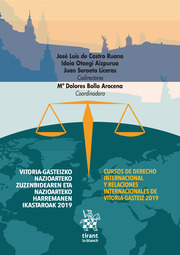La guerra en Ucrania como cambio de paradigma para la seguridad y la defensa en Europa
de la gestión de crisis en el exterior a la disuasión y la defensa territorial
- ISBN: 9783034351928
- Editorial: Peter Lang
- Fecha de la edición: 2025
- Lugar de la edición: New York. Estados Unidos de Norteamérica
- Encuadernación: Cartoné
- Medidas: 24 cm
- Nº Pág.: 192
- Idiomas: Español

La Guerra en Ucrania ha supuesto un cambio de paradigma en la polìtica de seguridad y defensa de la UE. Ha pasado de ser un tabú en el proceso de integración europea a ocupar un lugar central en la agenda comunitaria. Tal revitalización venìa produciéndose de manera progresiva desde la Estrategia Global para la Polìtica Exterior y de Seguridad de 2016. Sin embargo, el contexto bélico transforma la dimensión del proceso. Paradójicamente, nos obliga a dotarnos de capacidades de seguridad y defensa nunca antes previstas, pero nos hace más dependientes y menos autónomos en nuestra capacidad de decisión. Este libro analizará crìticamente el desafìo que supone, asì como los nuevos instrumentos de que se dota la UE en esta materia. La guerra obliga a la UE a reinventarse como actor geopolìtico y de seguridad, en lugar de actuar solo como un actor normativo y tecnocrático.
This monograph explores the current state of the European Common Security and Defense Policy (CSDP) in the context of Russia's invasion of Ukraine. Dr. José Luis de Castro argues, with precision and clarity, that the Ukraine crisis has both quantitatively and qualitatively transformed the CSDP while, paradoxically, reducing its strategic autonomy. He convincingly posits the hypothesis that effective security on the European continent will only be guaranteed with Russia's participation.
-Andreu Olesti Rayo, Professor of Public International Law and International Relations, Universitat de Barcelona
This work is a complete, original, and innovative analysis of the Ukraine war. It is an important contribution to the studies on security and defense in Europe. The author convincingly explains how increasing the military capabilities of the European Union will not make it a more autonomous actor in the international context, because it is key to build an inclusive European security order with Russia.
-Marìa Sagrario Morán, Professor of Public International Law and International Relations, Universidad Rey Juan Carlos









